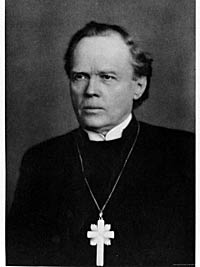Readings:
Psalm
133
2 Kings
22:3-13
1
Corinthians 1:10-18
John 13:31-35
Preface of Apostles
PRAYER (traditional language)
Almighty God, we bless thy Name for the life and work of Nathan Söderblom,
Archbishop of Uppsala, who helped to inspire the modern liturgical revival
and worked tirelessly for cooperation among Christians. Inspire us by
his example, that we may ever strive for the renewal of thy Church in
life and worship, for the glory of thy Name; who with Jesus Christ and
the Holy Spirit livest and reignest, one God, for ever and ever. Amen.
PRAYER (contemporary language)
Almighty God, we bless your Name for the life and work of Nathan Söderblom,
Archbishop of Uppsala, who helped to inspire the modern liturgical revival
and worked tirelessly for cooperation among Christians. Inspire us by
his example, that we may ever strive for the renewal of your Church in
life and worship, for the glory of your Name; who with Jesus Christ and
the Holy Spirit lives and reigns, one God, for ever and ever. Amen.
This commemoration appears in A Great Cloud of Witnesses.
Return to Lectionary Home Page
Webmaster: Charles Wohlers
Last updated: 16 May 2020
NATHAN SÖDERBLOM
ARCHBISHOP OF UPPSALA, 1931
 Nathan
Söderblom was born in Trönö, Sweden, in 1866 and ordained
in 1893. He was chaplain at the Swedish Embassy in Paris from 1894 to
1901, and earned a doctorate in comparative religion from the Sorbonne.
He then became professor of the history of religion at the University
of Uppsala, and in 1914 became Archbishop of Uppsala and Primate of the
Church of Sweden.
Nathan
Söderblom was born in Trönö, Sweden, in 1866 and ordained
in 1893. He was chaplain at the Swedish Embassy in Paris from 1894 to
1901, and earned a doctorate in comparative religion from the Sorbonne.
He then became professor of the history of religion at the University
of Uppsala, and in 1914 became Archbishop of Uppsala and Primate of the
Church of Sweden.
Söderblom, a Lutheran in a church that had retained the historic episcopate, valued the liturgy and devotional tradition of traditional Catholic worship, while seeing much of worth in the writings of liberal Protestant scholars. He believed it his duty to work for a united Christendom, both catholic and evangelical, and saw practical cooperation on social issues as a promising first step. During World War I, he worked tirelessly to alleviate the conditions of prisoners of war and refugees. For this and his subsequent work for Church unity and world peace, he received the Nobel Peace Prize in 1930. At Stockholm in 1925, he organized the Universal Christian Council on Life and Work. Meanwhile, a chiefly Anglican group had formed an inter-denominational Conference on Faith and Order. In 1948 the two groups merged to form the World Council of Churches. As Archbishop of Sweden, he was concerned to deepen the channels of communication between the Church and the laboring masses, and also between the Church and the intellectuals. He died 12 July 1931.
— by James Kiefer